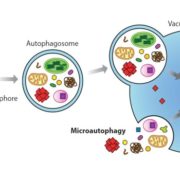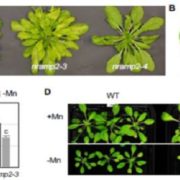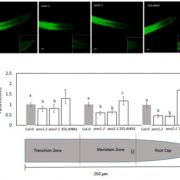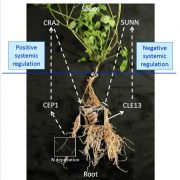Role of a Medicago truncatula citrate transporter in symbiotic nitrogen fixation (Plant Physiol.)
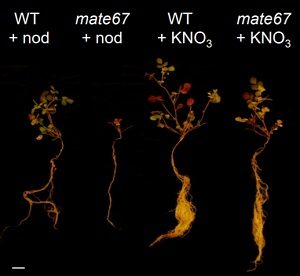 Iron, an essential nutrient for plants and symbiotic nitrogen-fixing bacteria, needs to be complexed with organic chelators (i.e. citrate) for in planta transport. Kryvoruchko and colleagues have identified a nodule-specific citrate transporter of Medicago truncatula, MtMATE67 (Medicago truncatula Multidrug and Toxic Compound Extrusion 67) using in planta localization, mutant analysis and electrophysiological analysis. MtMATE67 localizes to the plasma membrane of cells in the nodule, as well as the symbiosome membrane around bacteroids (nitrogen-fixing structures of Sinorhizobium meliloti). When the MtMATE67 is expressed in oocytes, the exportation of citrate happens in an iron-activated manner. MtMATE67 mutants accumulate iron in the apoplast of nodule cells, and have a decrease in symbiotic nitrogen fixation and a decrease in plant growth. Thus, MtMATE67 plays an important role in mediating citrate efflux from nodule cells to ensure iron mobility and availability for rhizobial bacteroids. (Summary by Julia Miller) Plant Physiol. 10.1104/pp.17.01538
Iron, an essential nutrient for plants and symbiotic nitrogen-fixing bacteria, needs to be complexed with organic chelators (i.e. citrate) for in planta transport. Kryvoruchko and colleagues have identified a nodule-specific citrate transporter of Medicago truncatula, MtMATE67 (Medicago truncatula Multidrug and Toxic Compound Extrusion 67) using in planta localization, mutant analysis and electrophysiological analysis. MtMATE67 localizes to the plasma membrane of cells in the nodule, as well as the symbiosome membrane around bacteroids (nitrogen-fixing structures of Sinorhizobium meliloti). When the MtMATE67 is expressed in oocytes, the exportation of citrate happens in an iron-activated manner. MtMATE67 mutants accumulate iron in the apoplast of nodule cells, and have a decrease in symbiotic nitrogen fixation and a decrease in plant growth. Thus, MtMATE67 plays an important role in mediating citrate efflux from nodule cells to ensure iron mobility and availability for rhizobial bacteroids. (Summary by Julia Miller) Plant Physiol. 10.1104/pp.17.01538


